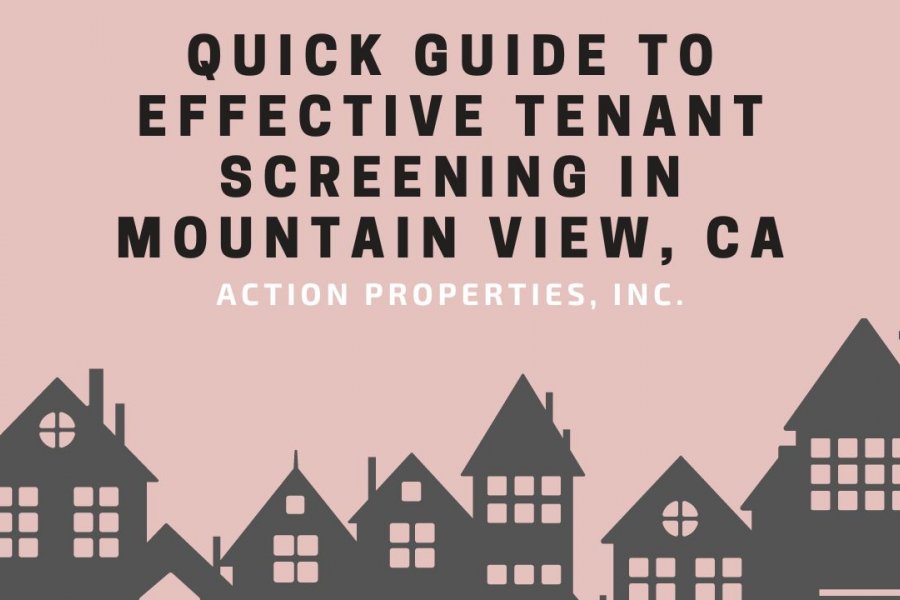
Tenant screening is the ultimate defense against bad and problematic tenants when renting out your property. With a comprehensive screening solution, you can weed out potentially bad tenants and ideally place a quality, long-term tenant on your property. A quality tenant will give you peace of mind in the long run and also consistency in the rental income.
How should you go about the screening of tenants? What information do you need from a potential tenant? In this article, the leading property management team in Mountain View, Action Properties, advises landlords in the area.
Minimum Qualifications
Being new to the process, the first step is to consider the minimum expectations of a quality tenant. What is the minimum standard for a tenant? Deciding on these criteria will streamline the selection process. From our experience in the CA property industry, the bare minimum should be:
• A tenant who pays rent on time
• One who can pay rent
• One who is responsible
• One who has no criminal record
You might want to add more qualifications to the above criteria. Before doing so, we advise that you read the Fair Housing Laws. This particular federal law protects tenants from discrimination in any manner from a landlord in the selection process.
Pre-screening
As you continue reading this article, you will establish that the tenant and pet screening processes can take up a significant amount of time. To cut down on this, you can use a pre-screening process or steps to deal only with interested and serious tenants.
.jpg)
Be sure to list out the property requirements in the listing or property ad. The information, for example, two months’ deposit or comprehensive screening, should scare away bad tenants who know they are unable to meet the set requirements.
Meeting the potential tenant in person will help you get a good feel for the type of tenant you are dealing with. You will also be able to ask them relevant questions and pass across your requirements on tenant qualification.
Rental Application Form
Tenant screening involves the assessment of a tenant’s qualification through the use of various checks. You will need information from the tenant. Put together a rental application form for this purpose. On the application, ask for the following information:
• Contact information
• Current and prior place of residence together with the landlords’ contact information
• Current and prior places of employment and a contact person at each company/ institution
• Salary amount
As you can ascertain, the information derived from the tenant is very personal. It should be treated in confidentially and not shared with any other entity.
Part of the application form should include an authorization section. This allows you as the landlord to perform landlord reference, background, and credit checks using the information provided. If this is not provided for, this is a potential red flag? If the information is truthful, what should the tenant have to hide?
Income and Employment Checks
Using the employment references, you want to confirm the employment and financial situation of your potential tenant. Some tenants might submit fake employment references. It might be their relative or friend. You can ask to do a video call to see their faces and also do a check online.
.jpg)
As a rule of thumb, the rent paid should be a third of a person’s income. Using the information provided by the employment contact referee, you can be able to ascertain this. You are looking for a tenant who will be able to pay their rent on time and in full and who has never broken their lease before.
Rental History Check
You will also want to get in touch with the previous and current landlords. Here, you are looking to learn what type of tenant they are. Here are some questions that you can ask previous landlords:
• Do they pay their rent on time?
• Do they relate well with their neighbors?
• Do they maintain the property in good condition throughout the term of the lease?
• Is their pet well-behaved? (this applies to pet-friendly properties)
Similar to what was mentioned above, the potential tenant may decide to give false references as their landlord referees. You can ask very specific questions that only a landlord would know about.
Credit Checks
Part of the screening process includes requesting a credit check. What do loans and debt tell you about a tenant? The issue is not the amount of loans they have but if they pay them on time. Their credit score should be able to give you an idea of that.
From our experience, a credit score of 680 and above is good enough.
Accepting or Denying Potential Tenants
After a rigorous check into the information provided, you will have made up your mind on who should be your tenant. You should be ready to do an email to all tenants and inform them of the situation.

For the accepted tenant, you should inform them of the next steps. They should sign the lease agreement and pay the security deposit as you agree on an ideal day for them to move in. You can choose to do this via email or in person.
For the denied applicants, it is ideal for you to communicate via email. If you’ve used the information provided above and followed the provisions of the Fair Housing Laws, you should have verifiable evidence on why you are rejecting them as a tenant.
Bottom Line
We understand that you are worried about the earnings from your Mountain View property. You would want to start getting income within the shortest time possible. However, the quality of the tenant on the premises also matters. A quality tenant will reasonably maintain your premises and pay the rent on time.
Not every landlord can perform a thorough tenant screening job. If you feel overwhelmed with the idea of screening, you can approach the leading property firm in Mountain View, Action Properties. We have years of experience in the local property market. With us as your manager, you can be assured that every element of the property shall be catered for.
Feel free to get in touch with us.
Disclaimer: This blog should not be used as a substitute for legal advice from a licensed attorney in your state. Laws change, and this post might not be updated at the time of your reading. Please contact us for any questions you have in regards to this content or any other aspect of your property management needs.